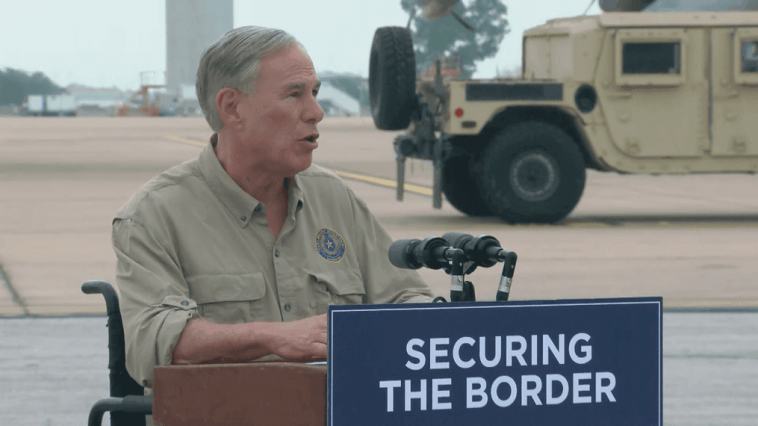Amid unfolding border developments, Texas Governor Greg Abbott has reaffirmed his intent to stand strong in his efforts to fortify the state’s southern frontier. The U.S. Supreme Court earlier sided with the Biden administration, allowing the defacement of the razor wire barricades erected by Texas to curb unauthorized border crossings.
In executing his dedication to border security, Governor Abbott approved the installation of about 30 miles of razor wire along the state’s southern perimeter. The decision came as a practical response to the growing number of undocumented immigrants attempting to make their way into Texan territory.
However, the United States Border Patrol repeatedly intervened, creating openings in the wire fence to allow undocumented immigrants access into the country. This action led Texas to lodge a legal dispute against the prevailing Biden administration; the state claimed federal officials had caused property damage and unauthorized trespassing.
In the high-profile face-off between Texas and the federal government, NBC News reported Monday’s close Supreme Court ruling in favor of the latter. In a taut 5-4 decision, the Justices approved an urgent appeal from the Biden administration. They granted federal agents the license to create breaches in the razor fence, given their argument that the impediment restricted their reach to undocumented immigrants who had made it across the border.
Governor Abbott, undeterred by the Supreme Court’s decision, voiced his unwavering commitment to the cause. His rhetorical stand: ‘This is not over.’ He underlined that the razor wire deterrent contributed to countering the Biden administration’s perceived encouragement of illegal border crossings. Abbott pledged to persistently uphold Texas’ constitutional right to guard its border and safeguard its property against federal interventions.
Alongside Governor Abbott’s tenacious statement, the Texas Department of Public Safety’s spokesman Chris Olivarez reiterated the state’s dedication to implementing advanced tactics such as ‘reinforced concertina wire & anti-climb barriers.’ In their enduring commitment to curb the inflow of undocumented immigrants, Texas officials remain steadfast.
Under Governor Abbott’s Operation Lone Star, Texas upholds its security posture. Olivarez pointed out the continuing use of integrated border security measures— reinforced concertina wire and anti-climb barriers along the Rio Grande—as an effective deterring strategy against unlawful border crossings.
The spokesperson raised a consequential issue—isn’t the real concern the Federal Government’s continual obstruction of Texas’ efforts to conduct border protection? Furthermore, the acceptance of exploitative, perilous, and inhumane methods enabling illegal immigrants, including minors, to traverse a hazardous river where many have previously perished raises further questions.
Texas, standing distinct in its substantial and determined efforts, utilizes every strategy and resource at its disposal to ensure its sovereignty, tackle illicit activities, and deter undocumented immigration. The State has pledged to ‘hold the line,’ adapting and responding to the changing dynamics at the border.
The Supreme Court’s ruling witnessed Republican Justices John Roberts and Amy Coney Barrett vote alongside the court’s three liberals. However, this 5-4 decision does not represent a conclusive judgment but merely provides an interim solution. Consequentially, federal agents may cut through the concertina wire during the ongoing litigation process.
Despite the Supreme Court’s decision, legal dynamics are still in flux—the 5th Circuit Court of Appeals has yet to come down with a definitive ruling on the case, and oral arguments are set for February 7.
Three tumultuous years into President Biden’s term, staggering numbers have emerged. Customs and Border Protection agents have encountered approximately eight million undocumented immigrants attempting to cross the border into the United States without lawful permission.
Moreover, surpassing a disturbing milestone, the federal government has authorized the release of over 2.3 million undocumented immigrants into the American heartland—a move that underscores the country’s intricate border situation.
These historic numbers accentuate the extent to which the border crisis is testing both the federal government and states like Texas. As debates over border security mechanisms grow heated in the face of the Supreme Court ruling, the focus is now shifting to the pending ruling from the 5th Circuit Court of Appeals.
While the unfolding saga of Texas’ renewed approach towards border security marks one chapter in this broader story, it is crucial to note that states, irrespective of the current federal administration views, have a constitutional right, and indeed a public obligation, to uphold the security and wellbeing of their residents.
In conclusion, as the immigration debate rages on, the actions of states like Texas remind us of the complexities inherent in managing border issues and the stake each state has in ensuring the protection and safety of its people. The pursuit of balance between humanitarian concerns and legal obligations remains a perpetual and complex challenge.
Watch on the RNN YouTube Channel


